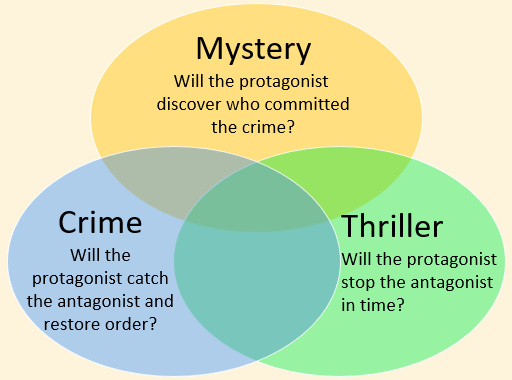The Mystery Genre
Mysteries are stories that actively engage the reader, much like a game. The writer leaves clues, and the reader pieces together the backstory—usually involving a crime. As a result, mysteries play with the reader’s curiosity and sense of satisfaction.
Mysteries (especially crime-related mysteries) allow readers to explore their sense of justice and morality. These stories are typically suspenseful with life-and-death stakes, allowing readers to empathize emotionally without the danger of first hand experience.

In the most general terms, a mystery is:
a story that begins with a question…
…and ends with an answer
Starting a story with a question hooks the reader’s curiosity. If someone is killed in the first scene, we want to know what happened, and most readers will read on to satiate their curiosity. If that question is not answered, however, readers can be left very unsatisfied and disappointed with the story.

Philosophically, a mystery story is an intellectual exercise that is about uncovering the truth about an event that happened.
Mysteries are challenging to write. Authors must hide important aspects of the story and selectively reveal them to the reader.
Unlike most stories, the antagonist is usually unknown.
Mystery and Crime
If you look at today’s most popular mystery novels, you’ll find most mysteries are crime-related, and of those crimes, the most common crime is murder (although kidnapping and theft are not uncommon).
Mystery can permeate other genres, too. A story that begins with someone suffering amnesia is a mystery (the opening question is “who am I?”). A science fiction story where an alien phenomena is observed (“what is that object?”).
Mystery and Related Genres

Contemporary stories are usually a mashup between multiple genres. Mysteries are often grouped together with Crime or Thriller stories. Each of these genres has different central questions.
Mystery Genre
Central Question: will the protagonist discover who committed the crime?
A mystery is an intellectual exercise, where a sleuth or investigator tries to answer a question, like whodunnit or howdunnit.
Examples: Sherlock Holmes, Agatha Christie, Knives Out, CSI, Murder She Wrote.
Crime Genre
Central Question: will the protagonist catch the antagonist and restore order?
A crime story centers around justice, law, and order. They are about the chase, the battle, the pursuit of the criminal rather than identifying who it is. Sometimes the protagonist is the criminal.
Examples: Lupin, Perry Mason, Thelma and Louise, The Shawshank Redemption, The Fugitive
Thriller Genre
Central Question: will the protagonist stop the antagonist in time?
A thriller is focused on the future, where there is an imminent deadline, ticking clock, or other impeding threat to the protagonist.
Examples: James Bond movies, The Da Vinci Code, The Day of the Jackal, The Manchurian Candidate.
Mysteries and thrillers are often combined such as a serial killer story (clues from a past mystery killing need to be investigated in order to stop a future killing).
In addition to the related genres, mysteries can be broken into many subgenres.
